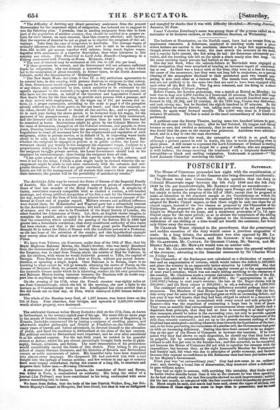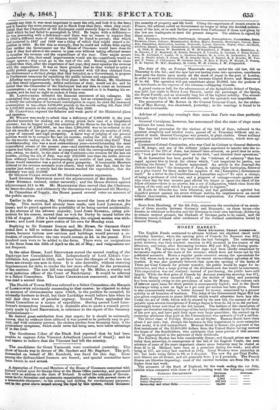POSTSCRIPT. SATURDAY.
The House of Commons proceeded last night with the consideration of the Sugar-duties; the state of the finances also being discussed incidentally.
The House went into Committee. On the question that the duty on Colonial Muscovado sugar between the 5th July 1848 and the 5th July 1849 be 13s. per hundredweight, Mr. BARKLY moved an amendment— Ile did not propose to alter the rates of duty upon Foreign and Colonial sugar, but simply to arrest the progress of the bill of 1846; except that he progto make an alteration in the standard sample at the Customhouse on which the duties are levied, and to substitute the new standard which the Government had adopted for Brown Clayed sugars, so that there might be only one class for all clayed sugars, instead of the two classes as proposed by the Chancellor of the Exchequer. He proposed to give a minimum protection of 4s. 6d. per hundredweight on Muscovado for six years, and a maximum protection of 73.7d. neon Clayed sugar for the same period; so as to obviate the complaints of the sliding scale of duties in the bill of 1846. He objected to the Government plan, that reductions of one shilling at a time would not benefit the consumer, but would only fritter away the revenue. Sir CHentas WOOD objected to the amendment, that the prearranged and sudden cessation of the duty would cause a previous stagnation of trade. In a long debate, the amendment was also opposed by Mr. LA, ROUDHERE, Mr. JAMES WILSON, and Mr. GoDSON: it was supported by Mr. GLADSTONE, Mr. CAYLEY, Sir Gnoacia CLERK, Mr. BRUCE, and Mr. HEN-ay BAIT.T.IV; Mr. MOwATT would vote on neither side.
It was Mr. GLA.DSTONE who turned the debate upon the general subject of the revenue; adverting to the financial statement by Sir Charles Wood on Friday last. The Chancellor of the Exchequer now calculated on a diminution of expenditure and an augmentation of revenue, which would reduce the deficit to 500,0001. and place the country in an apparently better situation by 1,000,0001. But that was done in part by taking what would in regular course go to the augmentation of next year's revenue; which was not really adding anything to the resources of the country. Mr. Gladstone made a counter-calculation: the Chancellor of the Exchequer still admitted a deficiency of 500,0001.; the "appropriations in aid" (500,0000 belong to next year's revenue; the loss on the Sugar-duties will be 300,000/.; and the Navy excess is 300,0001.; in all, a deficiency of 1,600,000/. The continued existence of an increasing deficiency entailed perhaps fatal consequences. The Members of that House must be well acq.uainted with the fact, that every year for some time past they had gone on with an increasing deficit; and last year it wail well known that they had been obliged to submit to a measure for its counteraction which was inconsistent with every sound and safe principle of finance—this was the expedient of contracting a large loan in time of peace. They were so sensible that extraordinary circumstances alone could justify such a departure from principle, that they lost no time in recording it as their opinion that measures should be taken in the succeeding year, not only to provide against any neoessity for contracting such loans, but also to provide for the repayment of the debt then recently contracted ; and yet up to the present moment nothing of that kind had been attempted—nothing whatever done towards the liquidation of the loan ; and, so far from preventing the recurrence of a similar evil, the Government had gone on with an increasing deficiency. During this time there seemed to be no disposition on the part of the House of Commons to increase the taxation. If he were asked why they had shown no such disposition, he should say that they bad not by palpable, but by unmistakable signs, shown this indisposition when they refused to add five per cent to the Income-tax; and this occurred, as he conceived, not because the House of Commons'did not wish to equalize the revenue with the expenditure, but because they, as the right honourable Member for Portsmouth had frankly said, felt what was due to principles of public economy, and further, because they reposed no confidence in the Estimates that had been put before them by her Majesty's Government.
If last year was "an extraordinary year,' they had now come to an ordinary year; and, drawing a broad, line of demarcation, they must not allow a &Eames' to pass without notice.
They had no right to assume, with anything like certainty, that trade would be better twelve months hence than it was at the moment he was then speaking. As he had already said, the last five months showed no such improvement; neither did the last month, as compared with the four months which immediately preceded it. Much might be said, and much had been said, about the signs of revival, but the evidence of those signs was more in hope than in possession; and he need scarcely say that it was most important to meet the evil, and look it in the fate; and it became the more necessary not to flinch from that duty, when they recollected that the Chancellor of the Exchequer could scarcely hope to effect that in 1848 which he had failed to accomplish in 1847. He began with a deficiency— le was proceeding with a deficiency—and there was no reason to suppose that in 1849 a different state of our finances would be found to prevail; that which had occurred in 1847 and 1848 was a thing of which they might expect a repetition in 1849. He felt this so strongly, that he could not refrain from saying that neither the Government nor the House of Commons would have done its duty if they had allowed the session to pass over without taking effectual means to equalize the revenue and the expenditure of the year. They might assure themselves of this, that small improvements would not do—expedients would no longer answer; they must go to the root of the evil. Nothing could be more argent than that, after the experience of last year, they must equalize the revenue with the expenditure. It was on these grounds that he thus wished to enter a public protest against these votes being proceeded with till they obtained from the Government a distinct pledge that they intended, as a Government, to propose to Parliament measures for equalizing the public income and expenditure. Alluding more particularly to the rival plans before the House, Mr. Gladstone said that small improvements, driblet reductions of duty, would not do; and he denied that the Chancellor of the Exchequer had any data to count on increased consumption: at any rate, he must already have counted on it in framing his estimates, and he had no right to reckon it twice over.
Mr. LaBOLIMIERE defended the financial statement of his colleague. He maintained that the present ismo ordinary year, but an extraordinary year: and to fortify the calculation of increased consumption in sugar, he cited the increased consumption in tea—from 3,690,000 pounds in the month ending 5th June 1847 to 4,109,000 pounds in the month ending 5th Jime 1848.
Mr. CARDWELL exposed the fallacies and weak parts of the Ministerial plans and speeches. Mr. Wilson was ready to admit that a deficiency of 2,400,0001. in the year afforded materials for making out a strong prima facie case of a dilapidated revenue; but he begged to call the attention of the House to the fact that out of this deficiency of 2,400,0001., no less than 2,200,0001. was to be referred to the last six months of the past year, as compared with the last six mouths of 1846, a year of unusual and high prosperity. A fairer way of judging of our present position would be to compare the last six months, ending the 5th of July, with the six months ending on the 5th July 1847. And what would they find? That notwithstanding this was a most extraordinary year—notwithstanding the most unparalleled events of the present year—and. notwithstanding the fact that our exports had fallen off 3,000,000/. as compared with the corresponding period last year, owing, no doubt, to the state of the Continent—the revenue for the last six months, ending the 5th of July, was only 209;0001. less than the entire revenue from ordinary sources for the corresponding six months of last year, which the House would remember was a period of great prosperity. If honourable Members referred to the revenue accounts more closely, they would also find, that for the quarter just ended, so nearly hail the income reached the expenditure, that the deficiency was only 35,0001.
Sir GEORGE CLERK reiterated Mr. Gladstone's counter arguments. Lord GEORGE BENTINCK moved the adjournment of the debate. Lord JOHN' RUSSELL resisted, rather earnestly; and the House divided against adjournment 211 to 80. Mr. Mitonmizin then moved that the Chairman do leave the chair; and. ultimately the discussion was adjourned till Monday. In Conamittee of Supply, the Housa passed several votes on account of the public service.
Earlier in the evening, .Mr. STAFFORD moved the issue of the writ for Derby. This motion had already been made, said Lord LINCOLN, See times; and to guard against the possibility of its being carried accidentally, in the absence ef the adverse majority, Lord. JOHN RUSSELL, citing precedents for his course, moved that no writ for Derby be issued before the 15th of August. After a brief conversation, the original motion wee withdrawn; and Lord Joins gave notice of his own for Monday next.
Replying to Sir ROBERT INGLIS and. Mr. HUME, Sir GEORGE GREY stated that a bill to reduce the Metropolitan Police rate ha& been withdrawn, because various new services and buildings would prevent a reduotion of expenditure; the rate would reluain at.6 in the pound. Five hundred men were to be added to the force. There were no resignations in the force from the 10th of April tu the 2d. of May; and resignations are not frequent.
In the other House, Lord BROUGHAM moved the second reading of the Bankrupt-law Consolidation Bill. Independently of Lord Eldon's Consolidation Act, passed in 1825, such have been the changes of the law that there are twenty-one acts in force. It is also desirable, without restoring imprisonment for debt, to render the law more effectual for the protection of the creditor. The new bill was compiled by Mr. Miller, a. worthy and most judicious officer of the Court of Bankruptcy. It would be referred to a Select Committee. The Loan CHANCELLOR concurred; and the bill was read a second time.
The Health of Towns Bill was referred to a Select Committee; the Marquis of LANSDOWNE reluctantly consenting to that course: he objected to delay on account of circumstances upon which, in the position he occupied, he advisedly forebore to dwell, but their Lordships would believe him when he said that they were of peculiar urgency. Several Peers applauded the Select Committee as Et means of expedition. Having quoted Lord Lansdowne's tremendous inuendo, it is desirable also to quote a remark previously made by Lord Baciurtnan, in reference to the report of the Sanatory Commissioners—
He derived great satisfaction from that report; for it should be universally known, that by evidence there adduced it was preyed to be perfectly easy to prevent, and with certainty prevent, the cholera morbus from becoming fatal, if the premonitory symptoms, which could, never fail. being seen, were taken advantage Of in due time.
Tho Gentleman Usher of the Black Rod reported that he had been unable to capture John Viscount Arbuthnot [accused of fraud]; and he had reason to believe that the Viscount had left the country.



























 Previous page
Previous page